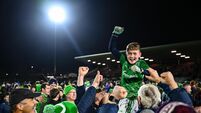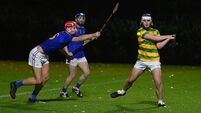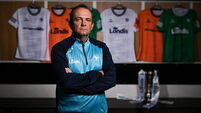Kieran Shannon: Jimmy Barry-Murphy still sprinkling some football magic
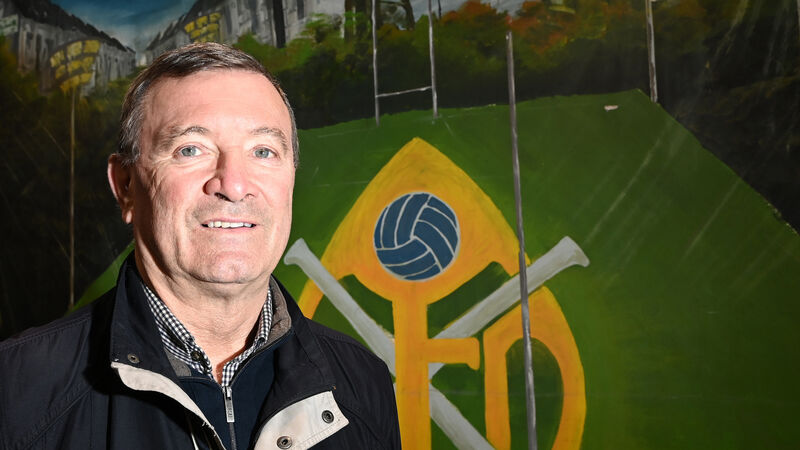
BARRS MAN: Jimmy Barry-Murphy, selector with St Finbarr's who play Nemo Rangers in the Cork SFC final at SuperValu Páirc Uí Chaoimh on Sunday. Pic: Eddie O'Hare
It’s come full circle. Jimmy Barry-Murphy back with the club in county finals and back at the football and back in love with the game.
At one point it nearly broke his spirit with its crushing cynicism but it’s also the one which he first made his name at for his and its capacity to provide such ingenuity and boyish joy.
We sometimes forget that.
At the St Finbarr’s press night ahead of this Sunday’s county final, Barry-Murphy himself pointed out there was a simple reason this was his first involvement with a Barrs football management team: prior to manager Brian Roche’s appointment and invitation at the start of last year, he had never been asked.
“I suppose I was considered more of a hurling [man], because I was involved [as a coach or manager] with Cork and Barrs hurling as well.”
When Barry-Murphy though, stands on the line alongside Roche, it’s not just as a fountain of wisdom from decades of playing or managing at the highest level or a totem of St Finbarr’s remarkable dual tradition; Barry-Murphy himself, between 1971 and 1985, played in 15 county finals, winning 11.
His presence is a reminder of one of the prime reasons he is probably the most beloved Cork sporting figure alive.
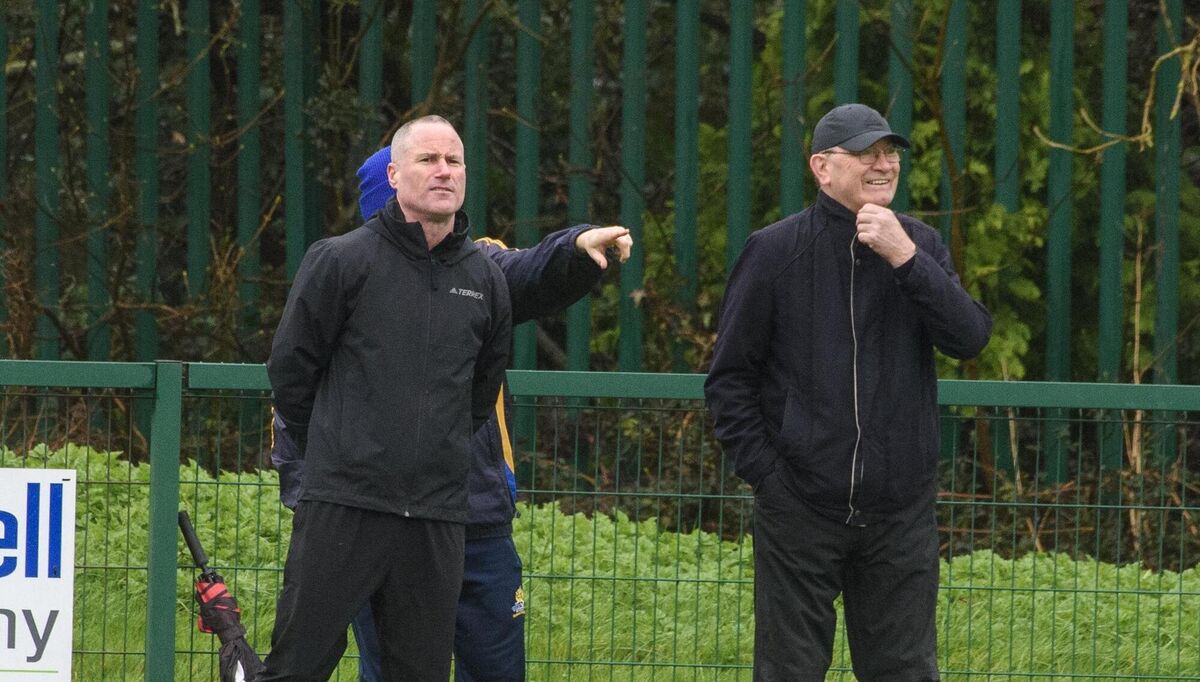
For all the county’s sporting ecumenism, GAA towers over the rest. That sporting organisation has two main codes. Of all the illustrious names that have excelled in both, Barry-Murphy is the dual star that shines brightest.
And that’s in large part because in the 1970s he was one of the best Gaelic footballers in the country and along with Matt Connor and Mikey Sheehy its most exciting.
Odes have been devoted to the Cork public’s reverence for Barry-Murphy to the point of being clichéd and cringe-inducing with all the man-love it engenders.
Yet it can be underestimated just how much affection and admiration he still commands outside the county and above and beyond the Galway-Dublin railway line that constitutes hurling’s border and limitations.
This past summer, I interviewed Martin Carney ahead of the championship clash of Donegal and Mayo, two counties he has served and loved. Carney is 74, three years older than Barry-Murphy, yet at one point in our conversation, he unashamedly gushed, “My hero is Jimmy Barry-Murphy. I loved watching him because he made the difficult look so simple. He had this way of finishing moves based on pure instinct and improvisation. You look at most of his goals in hurling or football; they’re almost all skittery goals into the corner that the keeper can’t get to.
“In 1975, I played for Ulster in the Railway Cup final on St Patrick’s Day. The night before, I met Jimmy with Billy Morgan in the Skylon Hotel [owned by Brian McEniff]. The Barrs were just after winning the hurling club All-Ireland and he was well on it, let’s just say. The next day, he went out against Ulster in Croke Park, had just six touches of the ball and scored 4-1.”
The year before that chat with Carney, I was in John Tobin’s living room in Tuam, where as one of football’s primary coach educators and minds, he animatedly spoke about the frustrations and possibilities of a game Jim Gavin’s FRC were about to examine and reimagine.
“I’m going to be very interested in the feedback from the skilful players, players like Shane Walsh. Because all the players we went to watch – Mickey Linden, Pádraic Joyce, Gooch, Jimmy Barry-Murphy – it was one-v-one, you were up off your seat: Jesus, there’s going to be a bit of magic here!”
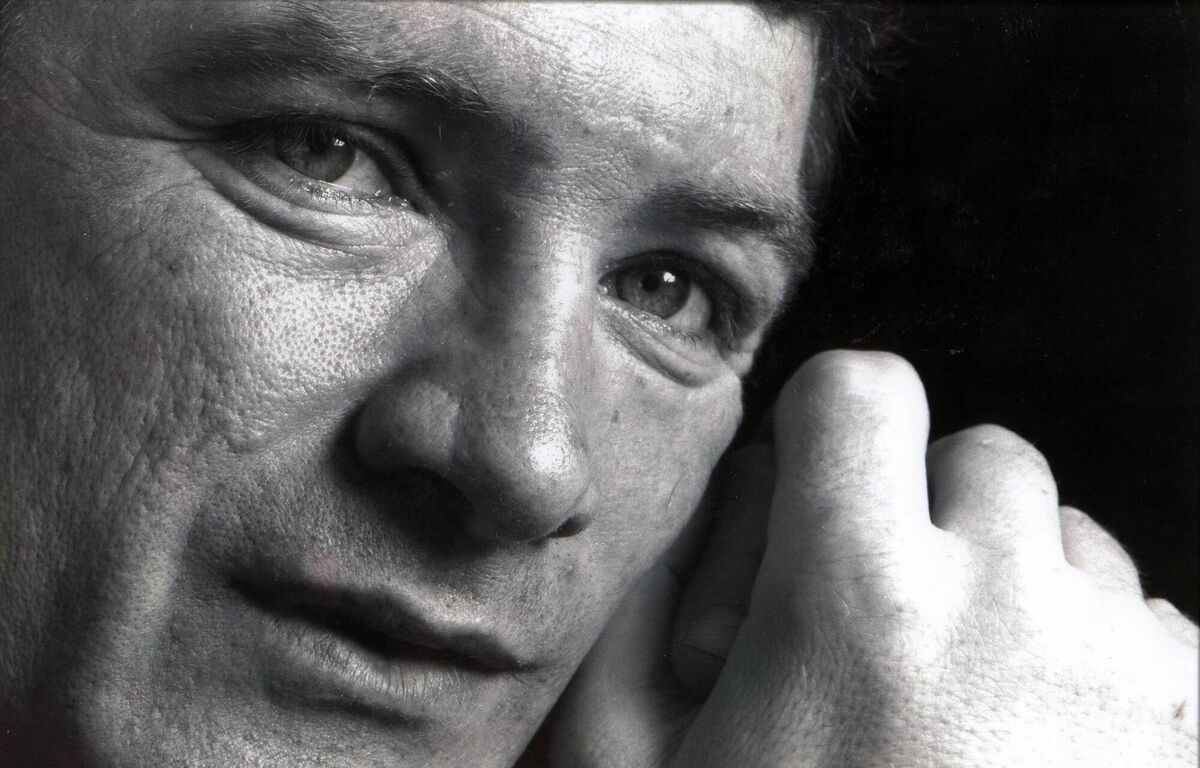
Tobin was on the pitch in Croke Park for that passage of play famously described by Michael O’Hehir in the final minutes of the 1973 All-Ireland final as Cork’s skin-headed rookie shrugged off Brendan Coleman pulling on his jersey before he started toe-tapping the ball.
“Jimmy Barry on the ’14. What’s he going to do? … A goal!” With that strike Barry-Murphy ended Galway’s comeback and Tobin’s own All-Ireland dream as well as Cork’s 28-year famine without Sam Maguire.
And yet Tobin was the same upon Barry-Murphy taking his team for 2-1 in Croke Park as Carney was for his team being taken for 4-1. He could still see the beauty in it. A bit of magic.
With that goal an icon was born. Over the next 13 years Barry-Murphy would provide plenty of more moments to rival it but in his eyes never top it. “Out of everything I won in my career,” he’d tell the BBC GAA Social Podcast this past summer. “Honestly, I would say winning the football All-Ireland in 1973 is my most cherished moment. The reaction in Cork was wonderful. It had been so long without a football All-Ireland.”
He brought something new to Cork football: daring, youth, city swagger. Twelve months earlier on the eve of the minor All-Ireland final, Micheál Ó Muircheartaigh bumped into him in the Skylon and Barry-Murphy told him, “Yeah, I feel good today. I’ll probably get two or three.”
He duly took Tyrone for two goals, just as he would in the following year’s senior All-Ireland semi-final.
“There was always a thing that Cork would have had big, strong men in the forward line, converted midfielders, but they couldn’t score,” he’d reflect in 2010 to Michael Moynihan. “Then you had fellas who were probably seen as city slickers coming in, the likes of myself, Ray Cummins, Billy Field. We were playing a different brand of football.”
Whatever about being the best Cork team ever, they were undoubtedly its most swashbuckling, as goal-hungry as the county’s hurling sides of 1990 or 2025.
In the Munster final, they took Kerry for five goals in the opening 25 minutes. Jimmy Deenihan was the one Kerry back to emerge that day with his reputation enhanced but even he was scarred and informed from the experience.
“Jimmy Barry scored a spectacular goal that day,” he’d write in his autobiography.” The ball appeared to be going wide but came back off the upright, whereupon Jimmy trapped it with his right foot and slid it into the net with his left foot without putting a hand on the ball. It taught me one lesson about marking him: never take your eye off him for a moment.”
In the years that followed, you couldn’t afford to. In 1974 he won another All-Star and Munster title. In 1976 he was even better again. By that point he had broken onto the county senior hurling team and was on the verge of winning the first of five All-Irelands in that code, but he wasn’t irreplaceable or irresistible like he was at the big ball.
In that year’s Munster final replay he took Deenihan for 1-3 from play.
“He was at his peak at the time as a footballer,” Deenihan has said, “arguably the best forward in the country.”
Kerry still won that day.
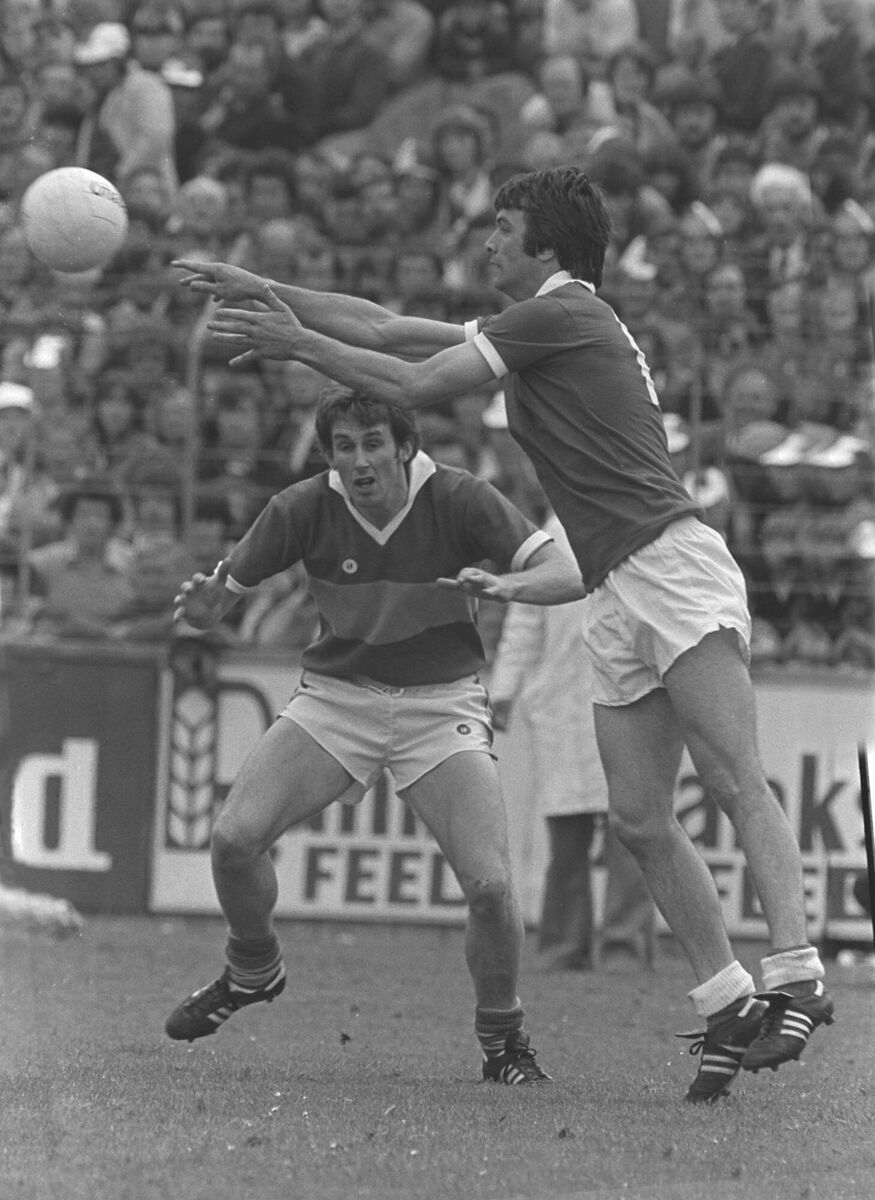
Undeservedly by Deenihan’s and Pat Spillane’s own admission, and to Barry-Murphy’s revulsion.
“My personal opinion would be that we were robbed of a Munster title that day,” he’d tell Moynihan for the book, Rebels. “I have never before or since seen a goal given like the one with Brian Murphy [wrongly adjudged to have been behind the goalline]. A whole generation of Cork footballers had their careers seriously affected by [officiating] decisions made that day.”
Barry-Murphy would soldier on for another four years with the county footballers but after the 1980 Munster final he had enough of how the game, more than Cork, was trending.
Deenihan makes the point that the last time he directly marked Barry-Murphy was the 1978 provincial decider and that while there was “some robust exchanges” between the pair that day, they were “trivial compared to incidents before and since on GAA pitches.”
After that 1978 final Barry-Murphy not only shook Deenihan’s hand but he and his wife Jean met up with Deenihan for a drink afterwards in the Imperial Hotel. When Deenihan brought out his book in 2011, Barry-Murphy was the guest of honour to launch it in Cork.
Deenihan understandably finds the idea that he personally accelerated or contributed to Barry-Murphy’s football inter-county retirement as “excessive and unfair”.
What is undeniable – at least to Barry-Murphy – is that Kerry as a collective and the game itself wore him down.
“Football was very cynical back then,” he’d later reflect. “I’ve no grudge to bear, I’m long gone beyond that, but Kerry were a very cynical team when they needed to be. There was huge pulling and dragging in football at the time. I hated playing the game because of it, the negativity against players… In hurling a defender had to hold onto his hurley at least… I’d love to be playing now with yellow cards and things for persistent fouling.
“It was the hardest thing I ever had to do in my career: tell Billy Morgan that I’d have to concentrate on hurling… But I was going nowhere and I wasn’t playing well for the footballers anyway.
“I felt guilty to a certain extent about the football because you always feel you’re letting the other side down. But let’s be honest, hurling in Cork city was always going to be my number one choice.”
His grá for Cork football would remain.
At the 1983 Munster final he was visibly jumping around in the open stand when Tadhgie Murphy produced a Seamus Darby moment of his own.
“I’d have given anything to be out there that day,” he’d say.
His love of playing football for the Barrs, meanwhile, remained undiminished; he’d go on to win a further three football county titles with the club after his last game with Cork, the last in 1985. They beat Duhallow by a goal and a point that day.
He scored 1-1, retaining his remarkable record of finding the net in each of the five county finals that the Barrs won during his time.
“I will still say to this day that it’s very few forwards who know where to put the ball in the net,” says John Allen, a dual teammate of Barry-Murphy’s with both club and county. “Most go for power. Jimmy was like David Clifford, Gooch. He could pick a spot knowing the keeper couldn’t get there. He was the fella you wanted to give the ball to because he invariably did the right thing with it.
“But he brought more than that and I can see why Brian, who is a former pupil of mine, has brought him in with the club’s footballers. Even going to matches with him, it was very reassuring.
"You’d always be guaranteed that whoever was in Jimmy’s company, there’d be a bit of joking. That helped ease a lot of the tension fellas might have been feeling before big games.”
Paul O’Keeffe, the club’s current chairman, will echo that.
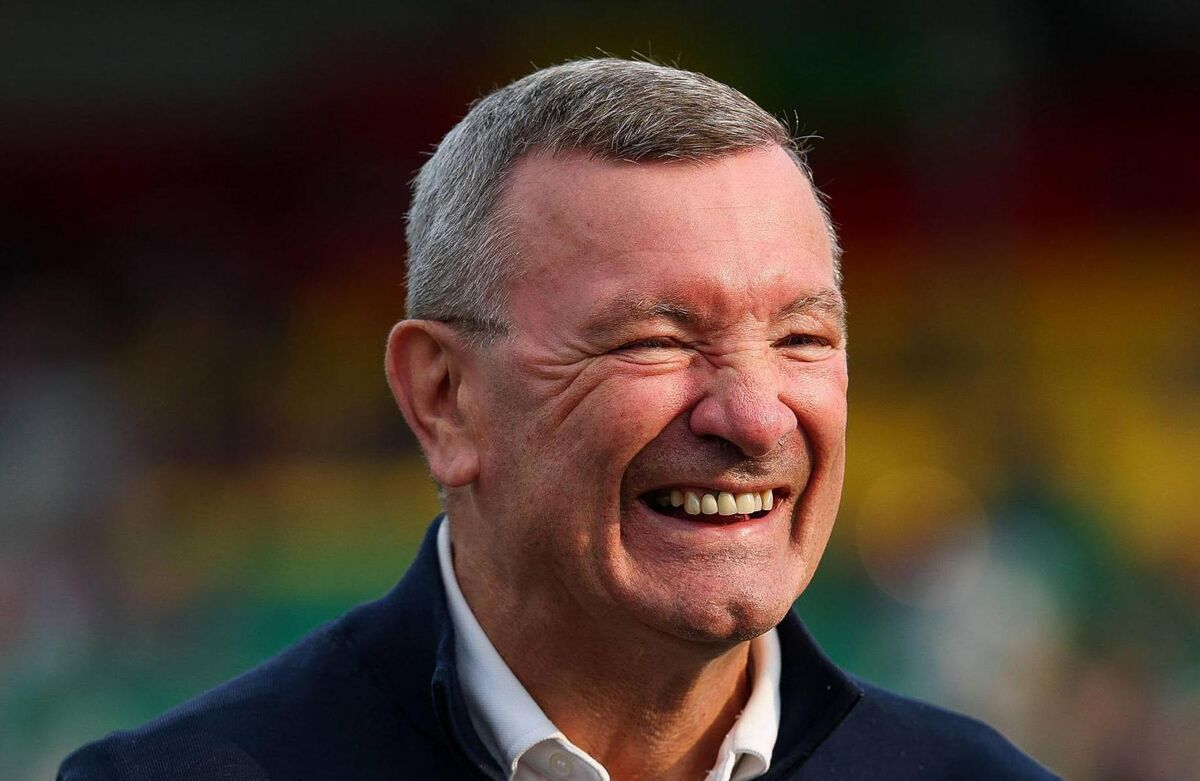
When the Barrs team he was manager of reached the 2021-2022 Munster club final against Austin Stacks, he asked Barry-Murphy to speak to the team after their last training session.
“He was brilliant. Just really sensible, practical, because he could relate to their situation. Get on the ball early, relax into it, keep your composure. And it’s the same now. He does a lot of the talking before the lads go out. He brings that sense of calmness. Finals, I’ve learned, are nuts. Cognitively, they’re exhausting; there’s so much going on. So to have someone of Jimmy’s experience, to spot things, stay calm, is a huge asset to have on the line and in the dressing room.”
He hasn’t neglected the hurling side of the club. This year he was also a selector to the club minor hurlers that won the P2 county title, managed and coached by the Murray brothers, Paudie and Kevin.
But working with Roche and the senior footballers has been particularly rewarding.
“I’ve loved every minute of it,” he said recently.
Serving the club. Mentoring young fellas. And also, he has openly said, working with and embracing the sport’s new rules.
“It’s so exciting now with the attacking dimensions of the game. The two-pointer has been a huge addition. It allows good players to get on the ball and get scores. And teams having to keep a number of players on either side of the field has to be positive.”
Allows for a bit of magic. Like he used to weave with that big ball.




